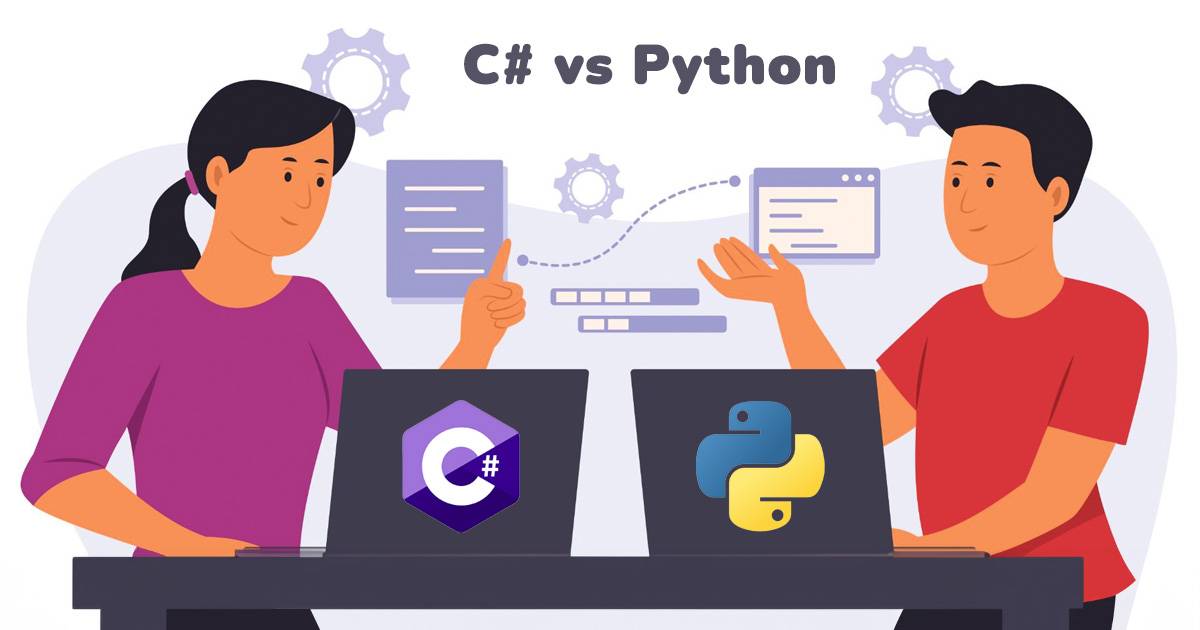C# vs Python: Choosing the Right Language for Your Project

Imagine yourself embarking on a journey to learn a new programming language, with Python and C# as your top choices. Both languages are incredibly popular, but which one should you choose? Learn about the main differences between Python and C# to help you make the right choice.
What is C#?
Microsoft developed the programming language C# to be a strong, dependable replacement for Visual Basic. It’s made to be quick and stable, so it works well for projects that need to be strong. C# is often used in game development, business software, and with the .NET framework.
Originally, Microsoft controlled C#, but now it’s open-source. This means that anyone can suggest improvements or use it for their projects. With its strong ecosystem and ties to the .NET framework, C# provides a solid and complete programming environment for many different kinds of projects.
What is Python?
Python is a well-known computer language that is simple to understand and use. People say it’s easy to understand and use, which makes it a great choice for both new and experienced coders. Python is used for a lot of different things, like building websites, analyzing data, machine learning, and creating artificial intelligence.
One of Python’s best features is its large library base. Libraries like NumPy, Pandas, and TensorFlow make it easier for developers to do complicated jobs quickly.
Python’s appeal also lies in its features, such as dynamic typing, support for various programming styles, automatic memory management, and compatibility across different platforms. These qualities have contributed to Python’s widespread adoption and strong presence in the programming world.
Comparing C# and Python
C# and Python are both popular programming languages, but they have some key differences:
Type System:
- C# is statically typed, which means variables must be explicitly declared with their data types. This helps catch errors at compile time.
- Python is dynamically typed so that variables can change types during execution. This flexibility can result in more compact code, but it can also make flaws more difficult to identify.
Syntax:
- Like C and C++, C# uses curly braces ({}) to separate blocks of code and semicolons (;) to end lines.
- Python uses indentation to define code blocks, which makes the code more readable. It doesn’t use semicolons to end statements.
Performance:
- When it comes to performance and speed, C# is generally faster than Python because it’s compiled into native code, whereas Python is interpreted and runs on a virtual machine.
- However, using libraries like NumPy or compiling code with tools like Cython can enhance Python’s performance.
Development Speed:
- Python is faster to develop than C#. Its dynamic typing and clear syntax make writing and understanding code quick and easy.
- Also, Python has lots of libraries available, so you can reuse code and speed up development even more. This is great for projects with tight deadlines or ones that need to be built and tested quickly.
Use Cases:
- C# is often used to make business software, games (especially with the Unity game engine), and Windows apps.
- Because it is easy to use and has many libraries, Python is famous for building websites, analyzing data, machine learning, and artificial intelligence.
Community and Ecosystem:
- Microsoft, which offers extensive documentation, tools, and support, supports C# and has a strong community.
- Python also has a large community with a wealth of libraries and frameworks, making it easy to find solutions and resources for almost any problem.
Platform Compatibility:
- C# code is not an interpreted language. It is typically compiled into Intermediate Language (IL) and runs on the Common Language Runtime (CLR), making it platform-independent.
- Python code is interpreted and runs on the Python Virtual Machine (PVM), which makes it portable across different platforms.
Whether you choose C# or Python depends on the needs of your project, how well you know the language, and which ecosystem you would like to work in.
When should I use C# and Python?
Choosing between Python and C# can be tough because both have strengths and weaknesses. To make your choice, consider what you like, what your job needs, and where you want your career to go.
Requirements for the Project
When choosing between Python and C#, it’s important to consider your project’s needs. Python’s many tools and frameworks make it great for building websites or teaching computers to learn.
But if you’re making a game or a big business app, C# might be better because it’s faster and works well with the .NET framework. By examining your project’s needs, you can decide which language is right for you.
Preferences and Career Objectives
Your personal preferences and where you want your career to go can affect which language you choose. If you’re more comfortable with one language or like how it looks, you might choose that for your project. Also, if you’re aiming for a specific field, like data science or game-making, picking the language that fits that field best can be smart.
C# vs. Python: Which is the better programming language?
Both Python and C# are strong programming languages, but each has its particular strengths. Many tools make Python a great language for quickly building projects in areas like web development, data analysis, and machine learning. On the other hand, C# is faster and better suited for tasks needing quick execution, like game development and big business applications. When picking between Python and C#, think about what your project needs and where you want your career to go. Both languages have strong communities and are useful for different kinds of projects.
